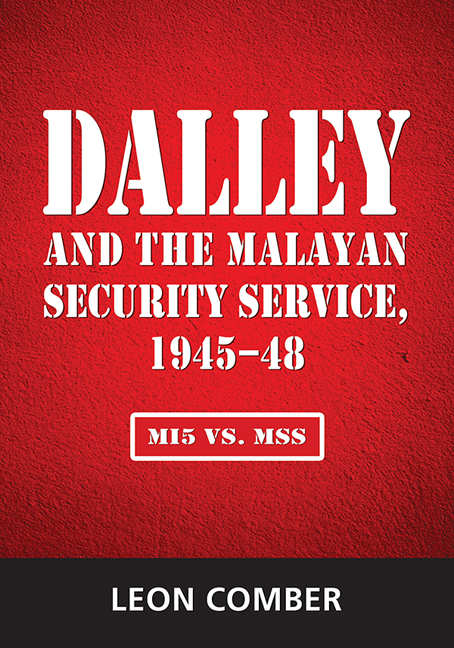Book contents
- Frontmatter
- Contents
- Preface
- Acknowledgements
- List of Abbreviations
- 1 Lieutenant Colonel John Dalley and the MSS: Early Days
- 2 Lieutenant Colonel John Dalley and Dalforce
- 3 The Establishment of “Security Intelligence Far East (SIFE)” in Singapore
- 4 Dalley's Return to Singapore
- 5 The Indonesian Situation and Malaya
- 6 Indonesian Encroachment into Malaya
- 7 Arrangements for Allocation of MSS Staff to Special Branch, Singapore, and Special Branch, Malaya
- 8 Conclusion
- Appendices
- Bibliography
- Index
- About the Author
- Frontmatter
- Contents
- Preface
- Acknowledgements
- List of Abbreviations
- 1 Lieutenant Colonel John Dalley and the MSS: Early Days
- 2 Lieutenant Colonel John Dalley and Dalforce
- 3 The Establishment of “Security Intelligence Far East (SIFE)” in Singapore
- 4 Dalley's Return to Singapore
- 5 The Indonesian Situation and Malaya
- 6 Indonesian Encroachment into Malaya
- 7 Arrangements for Allocation of MSS Staff to Special Branch, Singapore, and Special Branch, Malaya
- 8 Conclusion
- Appendices
- Bibliography
- Index
- About the Author
Summary
Thus the MSS was wound up and separate Special Branches were once again established in Singapore and Kuala Lumpur reporting to their respective Commissioners of Police. However, to complete this account of Singapore and Malaya's domestic intelligence services, when Singapore merged a few years later with the Federation of Malaya on 16 September 1963 to become part of “Greater Malaysia” with Tunku Abdul Rahman as Prime Minister, the Singapore Special Branch soon realized that it now had to serve more than one master. It not only reported to its own Director and the Singapore Commissioner of Police but it was required to report as well to the Director, Special Branch, Kuala Lumpur, and the Inspector-General of the Royal Malaysian Police as part of Greater Malaysia.
Who can ever forget Singapore's Prime Minister Lee Kuan Yew shedding tears on TV when he announced what amounted to Singapore's expulsion on 9 August 1965 from Greater Malaysia by Tunku Abdul Rahman, as Malaysia began to look less favourably on the effect that would be felt by absorbing the large predominantly Chinese population of Singapore on the overall ethnic balance of the new Greater Malaysia.
But the Singapore Special Branch of what had by then become the independent Republic of Singapore, soon consolidated its position and looking ahead to 17 February 1966 the Singapore Government converted the Special Branch into the Internal Security Department (ISD) which assumed responsibility for the country's domestic political and security intelligence. It was separate from the Singapore Police Force although working closely with it whenever required. This has remained the case until today, although the title “Special Branch” has been retained in Malaysia, where it is still a division of the police.
At the same time, the foundations of Singapore's external intelligence service were formed and the Security and Intelligence Division (SID) came into existence.
In fact, many Singapore Special Branch officers in those early days hardly noticed the change and continued to think of themselves as “Special Branch”, but during the intervening years the ISD has established itself and become the formidable, impressive and much admired intelligence organization it is today.
To revert to Dalley and the MSS, after he retired, Dalley's services were recognized on 8 July 1949 by the award of the King's Police Medal, which is undoubtedly a highly prestigious police decoration.
- Type
- Chapter
- Information
- Dalley and the Malayan Security Service, 1945–48 , pp. 104 - 106Publisher: ISEAS–Yusof Ishak InstitutePrint publication year: 2018

